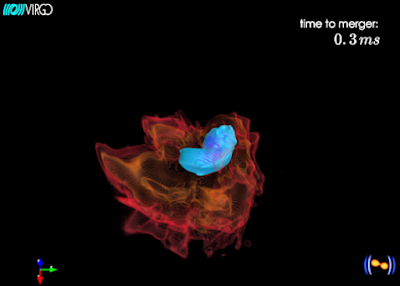 |
| Snapshot from the central region of a numerical simulation of two merging neutron stars. It shows the stars stretched out by tidal forces just before their collision. Credit: CoRe/Jena FSU |
Topics: Astronomy, Astrophysics, Black Holes, Einstein, General Relativity
In the nearly five years since their first direct detection, gravitational waves have become one of the hottest topics in astronomy. With facilities such as the Laser Interferometer Gravitational-Wave Observatory (LIGO), researchers have mostly used these ripples in spacetime to study the inner workings of merging black holes, but LIGO has also detected gravitational waves from other sorts of celestial crashes, such as the collisions of ultradense stellar remnants called neutron stars. Sometimes, however, LIGO serves up gravitational waves that leave astronomers scratching their heads—as was the case for GW190425, an event detected last April that was recently attributed to a neutron star merger.
The trouble is that LIGO’s data suggest this neutron star pair was substantially overweight—collectively, some 3.4 times the mass of the sun, which is half a solar mass heavier than the most massive neutron star binaries ever seen. “It is the heaviest known by a pretty wide margin,” says Chad Hanna, an astrophysicist at Pennsylvania State University who hunts gravitational waves.
The trouble is that LIGO’s data suggest this neutron star pair was substantially overweight—collectively, some 3.4 times the mass of the sun, which is half a solar mass heavier than the most massive neutron star binaries ever seen. “It is the heaviest known by a pretty wide margin,” says Chad Hanna, an astrophysicist at Pennsylvania State University who hunts gravitational waves.
Did Astronomers Just Discover Black Holes from the Big Bang? Nola Taylor Redd, Scientific American
Comments